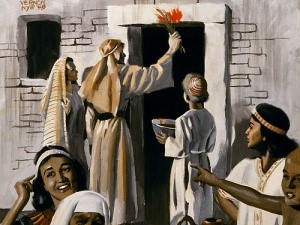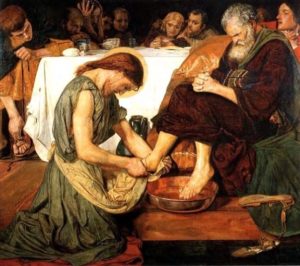OLD TESTAMENT READING: LEVITICUS 23
We learned about the seven feasts of Israel in Exodus 23. In Leviticus 23 we read of them again:
THE SABBATH – OUR RESTING IN THE TRUSTWORTHINESS AND SUFFICIENCY OF CHRIST (23:1-3)
The Sabbath is modeled on the seventh day of creation in which God rested in the satisfactory completion of His creative work (Gen 2:2). God said, ‘It is good!’ We can rest in what God is pleased with.
The Sabbath is a gift (Exodus 16:23-30). To further illustrate this the Lord gave twice as much manna on the sixth day, manna that would not grow stale or moldy so that no one would need to work for food on the Sabbath day. God’s people could not only cease from their own labors but rest in what God provided. And equally miraculous was the reinforcing fact that there would be no manna on the ground to collect on the seventh day. God’s people were being trained and commanded (in the fourth commandment of the Decalogue) to “remember the Sabbath day and keep it holy”.
The Sabbath Day was a reminder that God’s people can rest in the character of their Creator and Redeemer and all that He has done and will do on their behalf. It was to be a day of rest and worship. It was to be a day for a “holy convocation” where God’s people come together. God knows our need for physical rest and worshipping together as a gathered company of believers. The daily sacrifice for six days of the week would be one lamb. Two lambs were offered on the Sabbath (Numbers 28:9,19). We can worship every day during the week, but our joys are doubled when we are able to gather on the first day of the week and worship Him together in a holy convocation!
The law to keep the Sabbath Day is not repeated in the New Testament. We are told that the disciples gathered on the First Day of the Week as a testimony to the Resurrection. Jesus is the One who finishes the work of redemption. Just as God was satisfied when the work of creation was finished, so God is satisfied when the work of redemption was finished. Jesus cried from the cross, “It is finished!” (John 19:30). The work of redemption is perfect. God rests in it and we can too. We rest in that which satisfies the heart of the Father. The Bible word for the satisfaction that fulfills the requirements of justice and releases God’s delight in mercy is called “propitiation” (1 John 2:2; 4:10; Romans 3:25; Heb 2:17).
Jesus invites us to enter a lasting Sabbath rest by abiding in Him:
Matthew 11:28 (NIV) 28 “Come to me, all you who are weary and burdened, and I will give you rest.”
This Sabbath is an ongoing state of rest that reflects an ongoing state of trusting Jesus. It is not limited to a 24-hour period.
The original seventh day was one in which no evening or morning is recorded (Genesis 2:2-3). This is a prophetic picture of the eternal day of rest made possible through the finished work of Christ. The first six days in Genesis are recorded as having an evening and a morning (Gen 1:5,8,13,19,23,31), a beginning and an ending. The seventh day is described without any reference to beginning or ending (Genesis 2:1-2). It pictures an eternal day. Melchizedek, the priest who had no genealogy listed in the Bible, no record of beginning or ending of days, is a type of Christ in His eternal priesthood. The seventh day, with no record of beginning or ending, is a type of the eternal sabbath rest we have in Christ.
“This is the day the Lord has made. Let us rejoice and be glad in it!” (Psalm 118:24)
The writer of Hebrews speaks about the Sabbath rest that is ours to enter into in Christ. He reminds us that we can rest in the sufficiency of God’s promise even as we can rest in the perfection of His accomplished work of redemption (Hebrews 4:2). Jesus teaches this disposition of deep reliance, trust, and ready obedience as ‘abiding’ in the True Vine- Who He is and what He has done (John 15).
The Sabbath Day of the Old Testament is not a sufficient rest for God’s people, according to Hebrews 4:4. The New Testament clearly teaches that the Sabbath is a shadow of what was to come in substance in Christ (Colossians 2:16-17). Like the sacrifices of the Tabernacle, the Sabbath was a placeholder and signpost for the future grace that was to come in Christ. The Holy Spirit prophesied through David of a CERTAIN DAY of hearing God’s voice with a new heart that delights to do God’s will (Hebrews 4:7). “So there remains a Sabbath rest for the people of God.” (Heb 4:9). The writer implies that the promised rest is not found in keeping the Sabbath day, but in resting in the Person of our Sabbath. We can enjoy an ongoing state of rest in the sufficiency of His Word and His work because Jesus is the Perfect High Priest on our behalf (Hebrews 4:11-16). We need to abandon our own brand of self-justifying works and enter by faith into what brings rest to the heart of God— the perfections of Jesus Christ (Hebrews 4:10).
THE SABBATH YEAR– THE PROMISED RENEWAL OF THE LAND (Lev 25:18-22)
Not only were the people supposed to rest in the sufficiency of their Creator and Redeemer, but the land was to enjoy this rest also.
The promise of redemption affects the earth. Adam and Eve did not rest in the sufficiency of God’s word when they were tempted in the garden. As a result of their disobedience, the land was cursed and turned to a wilderness. Jesus, the second man, and the last Adam was tempted in the wilderness. He rested in the sufficiency of God’s Word (Matt 4:4). As a result of His obedience, we can be assured that one day the wilderness will be turned back to a garden.
THE FEAST OF THE PASSOVER– CHRIST DIED FOR OUR SINS (Leviticus 23:4-5)
As we have seen in the Book of Exodus. Jesus was crucified and shed His blood on the Feast of The Passover. God’s firstborn dies in our place, paying the penalty for our sin, that the angel of justice, who brings death, might not strike those who put their faith in the blood of the Lamb, claiming its payment as their own.
THE FEAST OF UNLEAVENED BREAD– SEPARATION FROM SIN (Leviticus 23:6).
Notice that the Feast of Unleavened Bread comes the day AFTER the Passover. Paul notes this relationship in 1 Corinthians 5:7:
7 Clean out the old leaven so that you may be a new lump, just as you are in fact unleavened. For Christ our Passover also has been sacrificed. (1 Cor 5:7)
Christ has made us holy (unleavened) through His sacrifice on the cross as our Passover Lamb (Heb 10:14). Now we can get rid of that sin and pursue personal holiness. This feast lasts for seven days.
THE FEAST OF FIRST FRUITS– RESURRECTION SUNDAY (Leviticus 23:9-14)
The day after the Sabbath, after Passover, is the Feast of First Fruit. The priest waves the firstfruit sheaf of the harvest, which is the result of a seed that fell into the ground to die to rise and bring forth a harvest (John 12:24). This sheaf of barley, the first fruit of the harvest, is to be accepted by God as a representative of the full harvest to follow. The Jews were not allowed to eat of the harvest until the firstfruit was offered to the Lord (Lev 23:14).
FEAST OF PENTECOST (Leviticus 23:15-21) THE BIRTH OF THE CHURCH
Seven weeks later, on the fiftieth day, the day after the seventh sabbath, the seventh week after the presentation of the first fruit (the Resurrection), the harvest is gathered in and two loaves are baked “with yeast” and presented to the Lord. The two loaves speak of both Jews and Gentiles presented together as one, although they both still have yeast (a type of sin). They are accepted because of the offerings made without defect on their behalf. This has its fulfillment in The Book of Acts, Chapter 2. (For more detail on the Significance of the Feast of Pentecost read the earlier notes on Exodus 23).
THE LAW OF THE HARVEST (Lev 23:22) THE WELCOMING OF THE GENTILES
Coupled with the commandments for ritual sacrifices on the Feast of Pentecost are the laws of the harvest. The corners of the field are to be left unharvested so that the foreigner and the needy will be able to freely glean. (In the Book of Ruth, we will see how Ruth, a Gentile who made an exodus from Moab to the Promised Land, finds acceptance and full provision through the kindness of this Harvest Law and the mercy of a Kinsman Redeemer. She becomes the ancestor for our Kinsman Redeemer, Jesus Christ.)
THE AUTUMN FEASTS- These have prophetic significance in that they are grouped together. The Spring feasts were fulfilled in the First Coming of Christ: Jesus died on Passover, was raised on the Feast of Firstfruits, and He sent His Spirit to bring in the harvest of Jew and Gentile on Pentecost. The autumn feasts will be fulfilled at the Second Coming.
These feasts take place in the seventh month. The Hebrew word for ‘seven’ is derived from a root word that means, “to be full, to be satisfied.” It is also related to the word that means “to swear, to make an oath.” The number seven is used in the Scripture in a way in which the Lord reminds us that what the Lord does and says is perfect and therefore completely trustworthy.
THE FEAST OF THE TRUMPETS (Leviticus 23:23-25) THE CALLING OF GOD’S PEOPLE
On the first day of the seventh month, the trumpet will sound to assemble God’s people. This day becomes “the head of the year” (Rosh Hashanah) ushering in a new civil year. It’s a day for a new beginning with the Lord and is spent in prayer, meditation, and confession. One day Israel will hear the call and be gathered before the Messiah.
THE DAY OF ATONEMENT (Leviticus 23:26-32) WHAT IS REQUIRED FOR FORGIVENESS
In Leviticus 16 we observed that this was the Great Day in which Atonement is made for sin. This is a day of humiliation when His people recognize their sins, repent of them and receive cleansing (Zech 12:10-13:1).
FEAST OF TABERNACLES (Lev 23:33-36) THE JOY OF ENTERING INTO A PREPARED PLACE
This feast reminds the people of Israel of God’s blessing them with His presence tabernacling among them. He cared for them and sheltered them in the wilderness. For a season they lived in booths. One day, in the land of their inheritance, they will live in houses, a place prepared for them. Jesus said, “I go to prepare a place for you” (John 14:2-3).
This was the “Feast of Ingathering”, a celebration of the completion of the harvest. This is a day of great rejoicing. By the eighth day, they had offered 199 animals (Numbers 29). The Feast of Tabernacles pictures the time when Israel receive their Messiah and how the Gentiles will celebrate their being gathered with them (Zech 14:16-19).
NEW TESTAMENT READING: Mark 9:30-10:12
The disciples discuss who among themselves is the greatest. Jesus’ answer is a wonderful ‘reality-check- for all would-be disciples.
Mark 9:35 (NASB) 35 Sitting down, He called the twelve and said to them, “If anyone wants to be first, he shall be last of all and servant of all.”
We give evidence that we have the heart of a Christ-like servant when we lovingly do as He does- receive a child, or minister a kindness, such as offering a cup of cold water to a brother or sister in Christ.
We are to focus upon Christ and not ourselves. Let us follow His example in the power of His Spirit.
The disciples tried to stop someone who was successfully casting out demons in Jesus’ Name just because he was not following with them. They themselves did not have the necessary faith to cast out demons in a recent incident (Mark 9:17-29). So, they resented that someone outside their group was having success. Sometimes we forget the patience that the Lord has demonstrated towards us throughout our past and fail to demonstrate that patience and understanding towards others! Remember we are all works in progress! Jesus explains that there are people outside our circle who are doing the works of the Lord and are growing in a more accurate understanding of Him, even as we are.
Mark 9:39 39 But Jesus said, “Do not hinder him, for there is no one who will perform a miracle in My name, and be able soon afterward to speak evil of Me.
The chapter closes with a warning that we must deal with sin or sin will deal with us. Sin contaminates us and it could easily cause other believers to stumble.
Notice how often Jesus warns of the danger of hellfire (v. 43-48).
A recent Barna report based on research commissioned by Alpha USA looks at the views on evangelism by practicing Christians (defined in the report as those who identify themselves as Christian, agree strongly that faith is very important in their lives, and have attended church within the past month). Among these, almost half of all Millennials (those ages 20 to 34) say it is wrong to share one’s beliefs, as do more than one in four (27 percent) of Gen-Xers (ages 35 to 53), and one in five Boomers (ages 54 to 72) and Elders (age 73 and older). They do not make any attempts to evangelize non-believers. Why? One explanation is that many of them do not take seriously what Jesus says about hell.
Jesus describes hell as a place of unquenchable fire and where the worm dies not (quoting Isaiah 66:24), in other words, there is an agonizing consciousness of hell’s eternal torment. Revelations 20:10 reminds us that hell is forever. It is so important that we warn people of their need for Christ and His salvation!
Revelation 20:10 10 And the devil who deceived them was thrown into the lake of fire and brimstone, where the beast and the false prophet are also; and they will be tormented day and night forever and ever.
It would be better to suffer loss of limb, dealing with sin and escaping hell through putting your trust in Christ, than suffer an eternity in hell having had your body fully intact and your sin not dealt with in this life. It would be better to die a violent death than to have died a peaceful death with no repentance of sin and suffer the consequences in hell.
In Chapter 10 Jesus teaches about divorce. We covered this incident when we read Matthew 19, but it is worth repeating that Jesus always upholds His original intention for marriage- a community of oneness, male and female joined in a life-long covenant commitment of self-sacrificing love, mirroring to the best of their abilities the oneness of the Godhead.
TODAY’S READING FROM THE BOOK OF PSALMS
PSALM 44:1-8
It is important to reflect upon the testimony of God’s grace in past generations. He has done great things! We remember the monumental works of deliverance He provided at the Red Sea, the conquest of Canaan, and most especially, through the cross of Christ. It is also beneficial to reflect upon the history of the church and how God faithfully worked in the lives of past generations. We learn that their victories were all of grace!
Psalm 44:3 3 For by their own sword they did not possess the land, and their own arm did not save them, but Your right hand and Your arm and the light of Your presence, for You favored them.
Verses 1-3 describe the operations of God’s grace in the past. Verses 4-8 describe His grace at work in the present.
Psalm 44:4-5 4 You are my King, O God; Command victories for Jacob. 5 Through You we will push back our adversaries; Through Your name we will trample down those who rise up against us.
In tomorrow’s reading, verses 9-26, we will learn of the Psalmist being puzzled that he and his people seem to be experiencing unwarranted hardships. He asks why? The Apostle Paul quotes the complaint and answers it in Romans 8.
TODAY’S PROVERB
Proverbs 10:19 19 When there are many words, transgression is unavoidable, but he who restrains his lips is wise.
Today we pray for BAHRAIN. As popular uprisings have been sweeping the Arab world, perhaps you have seen pictures of more than 100,000 people assembled to protest in Pearl Square on February 22. What is astonishing is that those assembled were 1/10th of the national population. According to the NY Times, this small desert kingdom is one of the most politically volatile countries in the Persian Gulf and one of the most strategically important to the USA which bases its Fifth Fleet there. Protestors are demanding sweeping political concessions from the ruling monarch, King Hamad Bin Isa al-Khalifa. Pray for peaceful resolve and good government.
PRAYER REQUEST: There are many more opportunities for Saudis and Kuwaitis and local Arab communities to hear the gospel. The labor force is 59% foreign, drawing from more than 50 nations. Most are on temporary contracts and often must endure poor treatment, poor pay, and unrealistic expectations from back home. Pray for the Christians among the national groups to be fruitful in evangelism. Nearly half the congregations and house groups are from South India. The less evangelized expatriate communities are Iranians, Sri Lankans, and Hindus, and Muslims from India and Pakistan. (See pages 131-132 in “OPERATION WORLD”)
PRAYER: Heavenly Father, we marvel at the perfection of Your Word. When we think of how you authored the seven feasts to remind Your covenant people of Your faithful provision in creation and redemption, we are amazed at how accurately their prophetic pictures are fulfilled in Christ Jesus. Your self-revelation in the Word inspires our worship. Thank You for the self-sacrificing example we have in Your Son, who modeled humility. Help us to abide in Him and live out His indwelling life to bless those we meet today. In Jesus’ Name. Amen.
Pastor David
So, naturally, we proclaim Christ! We warn everyone we meet, and we teach everyone we can, all that we know about him, so that, if possible, we may bring every man up to his full maturity in Christ. (Colossians 1:28, J.B. Phillips paraphrase)
New Life Community Church, Concord, MA 10742
www.newlife.org

